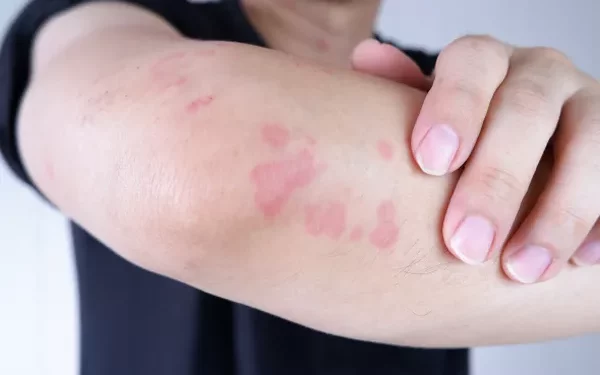Hives, medically known as urticaria, are a common skin condition characterized by raised, red, and itchy welts. While hives can occur due to a variety of reasons, including allergies, infections, and stress, the itching sensation they cause can be incredibly uncomfortable and disruptive to daily life. Fortunately, there are several remedies available to alleviate itching and provide relief for individuals suffering from hives. In this article, we will explore these solutions in detail, offering insights into their effectiveness and application.
Understanding the Itch:
Before delving into the remedies, it’s essential to understand why hives cause itching. When the body’s immune system releases histamine in response to allergens or other triggers, it can lead to the dilation of blood vessels and the leakage of fluid into surrounding tissues, resulting in the characteristic redness and swelling of hives. Histamine also stimulates nerve endings in the skin, leading to sensations of itching and discomfort. Therefore, any effective remedy for hives must address both the underlying cause of histamine release and the resulting itch.
Topical Treatments:
One of the most direct ways to relieve itching associated with hives is by applying topical treatments directly to the affected areas. These treatments often contain ingredients known for their soothing and anti-inflammatory properties, which can help reduce redness and calm irritated skin. Some common topical remedies for hives itching include:
1. Calamine Lotion: Calamine lotion contains a mixture of zinc oxide and ferric oxide, which work together to relieve itching and provide a cooling sensation when applied to the skin. It also helps to dry out the affected area, reducing inflammation and promoting healing.
2. Oatmeal Baths: Oatmeal has long been used for its soothing properties, particularly for skin conditions such as hives and eczema. Adding colloidal oatmeal to a warm bath can help alleviate itching and provide relief for inflamed skin.
3. Cold Compresses: Applying a cold compress to hives can help constrict blood vessels and reduce inflammation, effectively numbing the area and providing temporary relief from itching. Simply wrap ice packs or a bag of frozen peas in a towel and apply to the affected area for 10-15 minutes at a time.
4. Aloe Vera Gel: Aloe vera is well-known for its moisturizing and anti-inflammatory properties, making it an effective remedy for soothing itching associated with hives. Applying pure aloe vera gel directly to the affected areas can provide instant relief and promote healing.
Oral Medications:
In addition to topical treatments, oral medications can also be effective in relieving itching caused by hives. These medications typically work by blocking the action of histamine or reducing inflammation throughout the body. Some commonly used oral medications for hives itching include:
1. Antihistamines: Antihistamines are the primary treatment for hives and work by blocking the effects of histamine in the body. They can be taken in both over-the-counter and prescription forms and are generally effective in reducing itching and other symptoms associated with hives.
2. Corticosteroids: In cases of severe or persistent hives, oral corticosteroids may be prescribed to reduce inflammation and provide relief from itching. However, these medications are typically used as a short-term solution due to the risk of side effects with long-term use.
3. Leukotriene Receptor Antagonists: Leukotriene receptor antagonists, such as montelukast, may be prescribed for individuals with chronic hives who do not respond well to antihistamines. These medications work by blocking the action of leukotrienes, chemicals in the body that can contribute to inflammation and itching.
Alternative Therapies:
In addition to traditional topical treatments and oral medications, several alternative therapies may provide relief from itching associated with hives. While more research is needed to confirm their effectiveness, many individuals find these therapies to be helpful in managing their symptoms. Some alternative therapies for hives itching include:
1. Acupuncture: Acupuncture involves the insertion of thin needles into specific points on the body to promote healing and relieve pain. Some studies suggest that acupuncture may help reduce itching and inflammation associated with hives, although more research is needed to confirm these findings.
2. Herbal Remedies: Certain herbs and botanicals, such as chamomile, calendula, and witch hazel, have been used for centuries for their anti-inflammatory and soothing properties. Incorporating these herbs into topical treatments or teas may provide relief from itching and promote healing of hives.
3. Stress Management Techniques: Stress can exacerbate symptoms of hives, including itching, so finding ways to manage stress and promote relaxation may help alleviate symptoms. Techniques such as deep breathing, meditation, yoga, and progressive muscle relaxation can all be effective in reducing stress and promoting overall well-being.
Conclusion
Itching associated with hives can be incredibly uncomfortable and disruptive, but there are several effective remedies available to provide relief. Whether through topical treatments, oral medications, or alternative therapies, individuals suffering from hives can find relief from itching and other symptoms. By understanding the underlying causes of hives and exploring various treatment options, it is possible to manage symptoms effectively and improve quality of life for those affected by this common skin condition.
























